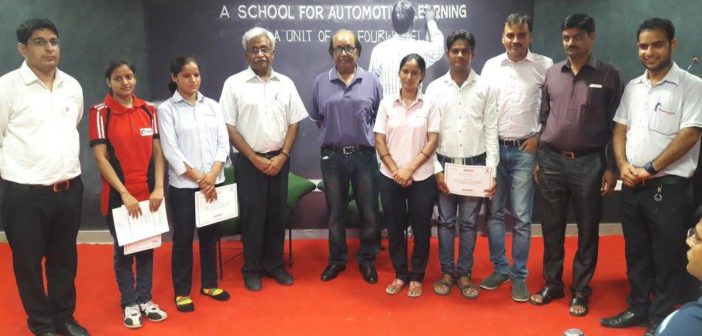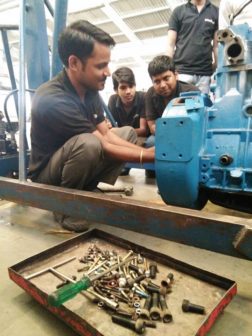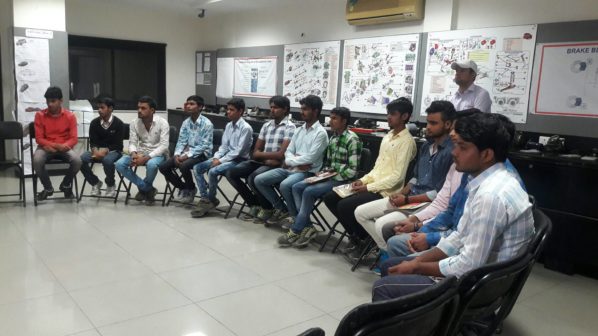Jobs in the automotive sector are not just about manufacturing. There is a steady demand for skilled and specialized workforce in Dealerships, Distribution and Services. In this Skill Story, Nikunj Sanghi, President, Automotive Skills Development Council (ASDC) and Founder, Aadharshila School of Automotive Learning, shares his insights on current needs of the industry and current concerns about quality skilling in the automotive sector and need to promote apprenticeships.
 To start with, let me tell you about my association with ASDC, I came into ASDC as a representative of FADA (Federation of Automobile Dealers Associations, India). ASDC is formed by ACMA (Automotive Component Manufacturers Association of India), SIAM (Society of Indian Automobile Manufacturers), and FADA. Now, to talk of why the entire skill development initiative was started by the government was that, the industry felt that under the present system, the right kind of workforce, who were employable by the industry, were not to be found. Therefore, the government was willing to put in money and allow us to train people the way we want them, the way the industry wants them- to make people employable- because the existing structures were not helping people become industry-ready. Thus, ASDC was formed by these three stakeholders representing the entire value chain from component manufacturing to distribution.
To start with, let me tell you about my association with ASDC, I came into ASDC as a representative of FADA (Federation of Automobile Dealers Associations, India). ASDC is formed by ACMA (Automotive Component Manufacturers Association of India), SIAM (Society of Indian Automobile Manufacturers), and FADA. Now, to talk of why the entire skill development initiative was started by the government was that, the industry felt that under the present system, the right kind of workforce, who were employable by the industry, were not to be found. Therefore, the government was willing to put in money and allow us to train people the way we want them, the way the industry wants them- to make people employable- because the existing structures were not helping people become industry-ready. Thus, ASDC was formed by these three stakeholders representing the entire value chain from component manufacturing to distribution.
Our original plan was to train people, but mid-course, we changed it to a need not to train people, but define skills’ standards; define how they will be trained; how they will be certified; and how they will become industry-ready. Our focus areas included component manufacturing, vehicle manufacturing, and distribution. Something such as this was never documented before, so we devoted the first 2 to 3 years to documenting all these. We also worked on creating the infrastructure- have sufficient number of training partners, assessment partners, spread across the length and breadth of the country.
 Aadharshila- School of Automotive Learning
Aadharshila- School of Automotive Learning
During the first 5 years of my association with ASDC, I realised we were still not getting people that we require. So, I decided to set up a training centre myself and select candidates- because I exactly know what kind of people I require when I want to recruit. I started from the scratch – prepared my own syllabi, my own content; trained my own trainers; etc. I received a lot of help from the manufacturers I was dealing with, primarily Mahindra and Hero, and from a lot of senior people in the industry.
 There is only one centre of Aadharshila. I was trying to create a model and see the outcome- whether the people who get certified by Aadharshila are the right ones? Are they different from the people we would have otherwise hired? We concentrated on only two courses- Technicians and Sales Consultants- as these provided the maximum volume in auto distribution and dealership infrastructure. During this period, I realised that theory was not important, what was important was on-the-job training- the candidate after certification should be job-ready from day one, should be productive from day one. The person or business, who/which employs the candidate, won’t have to invest further in training. We started with 2 batches- 15 technicians and 15 sales consultants. We provided 2 months training for sales consultants and 4 and half months training for technicians.
There is only one centre of Aadharshila. I was trying to create a model and see the outcome- whether the people who get certified by Aadharshila are the right ones? Are they different from the people we would have otherwise hired? We concentrated on only two courses- Technicians and Sales Consultants- as these provided the maximum volume in auto distribution and dealership infrastructure. During this period, I realised that theory was not important, what was important was on-the-job training- the candidate after certification should be job-ready from day one, should be productive from day one. The person or business, who/which employs the candidate, won’t have to invest further in training. We started with 2 batches- 15 technicians and 15 sales consultants. We provided 2 months training for sales consultants and 4 and half months training for technicians.
We had only 3 eligibility criteria for the candidates:
- They should be unemployed, as we are trying to bridge the gap between employed and unemployed people.
- They should be able to read and write. There is no requirement for a diploma, degree, etc.
- They should be willing to work with the dealer post-certification and not enrol in the course just for certification.
Success of Aadharshila
Even though there have been instances of candidates dropping out of the course due to their want of only government jobs and so on, the ones who have completed the course have been recruited by our dealerships and many other dealerships as well. We insist on 95% of attendance from candidates who continue the course, because we want them to experience the rigours of working in an industry and be prepared for it.
Collective Responsibility for Skill Development
The Sector Skills Council, the training partners, the assessment partners, and the government- everyone has to realise that this is not about numbers, but actually about making people employable. Collectively, we have to realise that government jobs are only 2% of the entire ecosystem, and if everyone aims for that 2% of jobs, then there is no way everyone will be employed.
Focus on quality
My focus, as President of ASDC, will be on quality. Candidates who come out of these training courses should be employable, because there is a huge gap between what is required and what is available. If we fill this gap, we will be able to stabilise manpower cost. I am only asking for people who can read and write. In the US, some of the top vehicle salesmen are school dropouts, because all that you need is present yourself, engage with the customer, understand the needs of the customer, and address those needs. You do not need degrees and diplomas for that. You need passion. What we need to realise is- “Education is not just about money. A lot of Education is about dedication, about commitment, about passion.” This holds true even for skilling. What is important is there should be some amount of passion, commitment, and dedication.
Importance of Apprenticeship/ Internship
 Apprenticeship is extremely important. In countries like Germany and Japan, the ones with the most successful models of skilling, the skilling courses are spread over 2-3 years and candidates start earning after a few months of training, which is called internship or apprenticeship. What we need to understand is, one needs 2/3 years for skill training and during that period earn simultaneously in the form of a stipend through internships. This kind of training will prepare one for a career path and not just for a skill level. There is still a lack of awareness within the state governments as to how this apprenticeship should be rolled out and how it is going to be monitored. I don’t mind the slow pace, but I would want only genuine apprenticeships to happen. I do not want another set of people who are creating records and not genuinely employing and training candidates.
Apprenticeship is extremely important. In countries like Germany and Japan, the ones with the most successful models of skilling, the skilling courses are spread over 2-3 years and candidates start earning after a few months of training, which is called internship or apprenticeship. What we need to understand is, one needs 2/3 years for skill training and during that period earn simultaneously in the form of a stipend through internships. This kind of training will prepare one for a career path and not just for a skill level. There is still a lack of awareness within the state governments as to how this apprenticeship should be rolled out and how it is going to be monitored. I don’t mind the slow pace, but I would want only genuine apprenticeships to happen. I do not want another set of people who are creating records and not genuinely employing and training candidates.
Dealership Becoming Aspirational
I think we definitely need to create an ecosystem where dealership becomes aspirational to candidates. We need to do some course correction; we need to have a documented HR policy, HR manual, etc. We need promotional policies, increment policies, well chalked-out career paths- which would encourage a candidate to take services in dealerships as a long-term career option, and not a stop-gap one. We all have to work together to make automotive an aspirational industry to work for and specifically the services sector.












